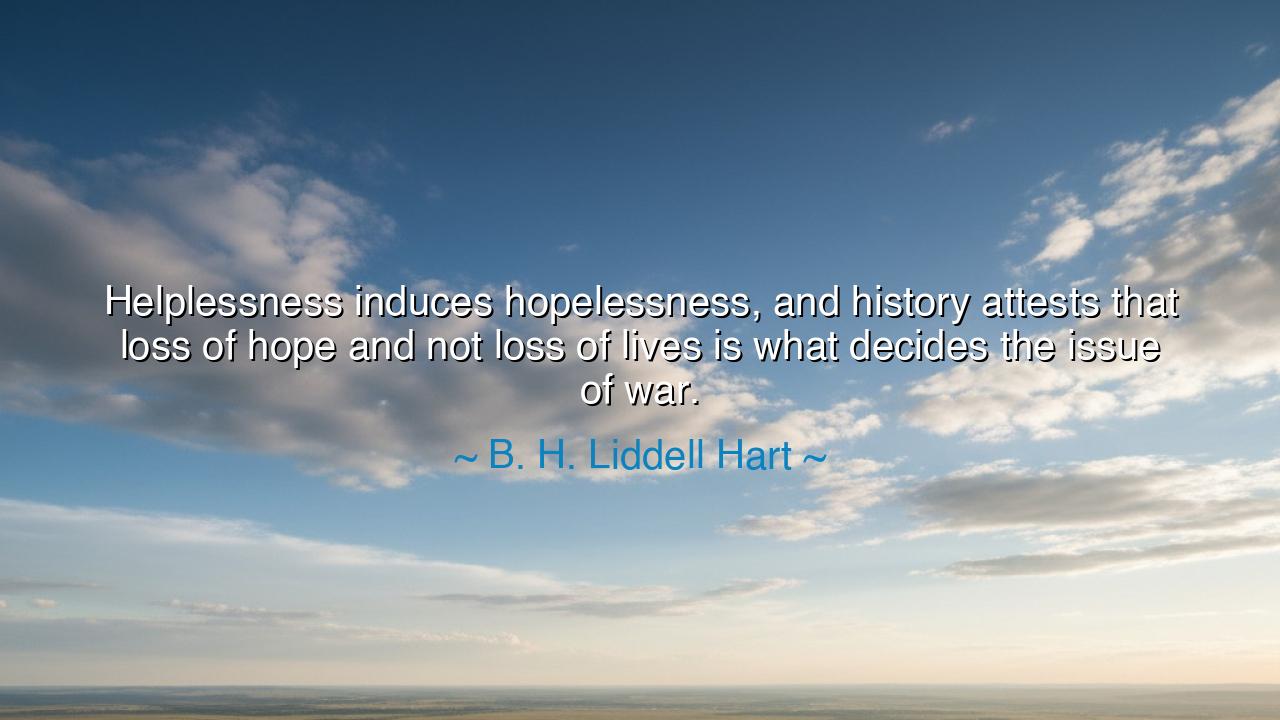
Helplessness induces hopelessness, and history attests that loss
Helplessness induces hopelessness, and history attests that loss of hope and not loss of lives is what decides the issue of war.






“Helplessness induces hopelessness, and history attests that loss of hope and not loss of lives is what decides the issue of war.” — B. H. Liddell Hart
There are truths in this world that strike the heart more deeply than the sharpest sword. So spoke B. H. Liddell Hart, the great strategist and historian, whose mind sought to understand not only the art of battle but the spirit that sustains it. His words carry a weight far beyond the fields of war — for they speak to every struggle of humankind. To say that helplessness induces hopelessness is to reveal the secret engine that drives victory and defeat alike: the will. The flesh may tire, the armies may bleed, but when the soul surrenders, the battle is already lost.
From the dawn of civilization, it has been so. The strength of nations has risen not merely from their weapons, but from their faith in themselves, from the fire of belief that refuses to die. When Liddell Hart declares that “loss of hope, and not loss of lives, decides the issue of war,” he speaks of the invisible current that flows beneath every struggle — the courage to endure, to believe when reason falters. History does not bend to the armies with the largest numbers, but to those whose hearts burn longest in the darkness.
Think of Winston Churchill, standing before the ruins of bombed London, his nation trembling beneath the might of the Nazi war machine. In those desperate days of 1940, Britain was isolated, its allies fallen, its people weary. Many believed defeat was inevitable. Yet Churchill’s voice thundered across the airwaves: “We shall never surrender.” Those words were more than defiance; they were the resurrection of hope. The people believed — and because they believed, they endured. The cities burned, but the spirit of the island did not. And so history turned, not upon the death toll, but upon the unyielding heart of those who refused despair.
The opposite truth can be found in the fate of France during that same war. Its army was large, its defenses formidable, its resources abundant. But when faith faltered, when the spirit of the nation gave way to fear, its walls crumbled faster than its soldiers could retreat. Helplessness became hopelessness, and hopelessness became surrender. Thus, Liddell Hart’s wisdom was proven once more: that the body of an army may still stand, yet its soul can already be slain. The war is never lost in the trenches, but in the hearts of those who fight them.
And what is true for nations is true for every human soul. Each person wages their own wars — unseen battles of fear, doubt, and despair. When life wounds us, when fate seems cruel and the way forward disappears, it is hope that keeps the spirit alive. To lose hope is to accept defeat before it comes; to keep hope is to defy even the impossible. The ancients knew this. In the ashes of Troy, in the exile of Rome, in the deserts of wandering prophets — it was never strength that carried them through, but belief. Hope is not weakness; it is the final weapon of the soul.
Consider also the tale of Nelson Mandela, who spent twenty-seven years imprisoned, cut off from the world he sought to change. Others might have yielded to bitterness, to the creeping poison of helplessness. But Mandela guarded his inner flame. He wrote, dreamed, and prepared, believing that one day freedom would rise again. When he finally walked free, the world saw that his chains had never bound his spirit. His hope had endured, and because it endured, the destiny of his nation was transformed. History changed, as Liddell Hart foretold, not through the survival of the body, but through the triumph of hope.
So, my children of the present and heirs of the future, remember this eternal law: the battle is not lost when the body falls, but when the heart ceases to believe. Despair is the true enemy, more dangerous than any sword or bullet. When you face hardship, when all paths seem blocked, guard your spirit from helplessness. Act — even if only in faith. Speak words of courage, even when your voice trembles. For as long as hope lives, so too does possibility.
Let your lives then be guided by this truth: that hope is strength disguised as gentleness. In war, in work, in love, in loss — it is the invisible force that decides all fates. Nourish it, protect it, pass it forward. And should the world ever seem too dark to bear, remember Liddell Hart’s wisdom: it is not death that conquers us, but despair. Hold fast to hope, for it is the light by which even the blind may find their way through the storm.






AAdministratorAdministrator
Welcome, honored guests. Please leave a comment, we will respond soon